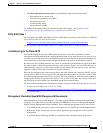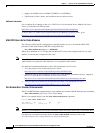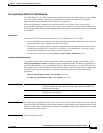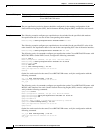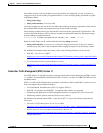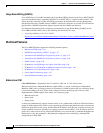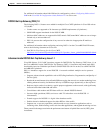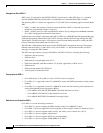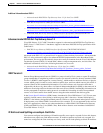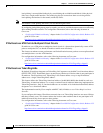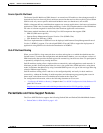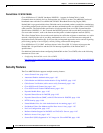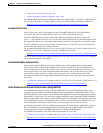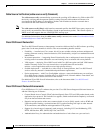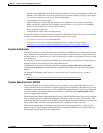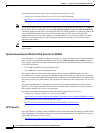
1-99
Cisco uBR7200 Series Universal Broadband Router Software Configuration Guide
OL-2239-05
Chapter1 Overview of Cisco uBR7200 Series Software
cops tcp window-size
Additional Information about DSG 1.1
• Advanced-mode DOCSIS Set-Top Gateway Issue 1.1 for the Cisco CMTS
http://www.cisco.com/en/US/products/hw/cable/ps2217/products_feature_guides_list.html
• DOCSIS Set-Top Gateway (DSG) for the Cisco CMTS
http://www.cisco.com/en/US/products/hw/cable/ps2217/products_feature_guide09186a00802065c8.html
• Cisco DOCSIS Set-top Gateway White Paper
http://www.cisco.com/en/US/products/hw/cable/ps2217/products_white_paper09186a00801b3f0f.shtml
• CableLabs DOCSIS Set-top Gateway (DSG) Interface Specification SP-DSG-I03-041124
http://www.cablemodem.com/downloads/specs/CM-SP-DSG-I03-041124.pdf
Advanced-mode DOCSIS Set-Top Gateway Issue 1.2
Cisco IOS Release 12.3(17a)BC2 introduces support for advanced-mode DOCSIS Set-Top Gateway
(DSG) Issue 1.2. DSG Issue 1.2 introduces support for the latest DOCSIS Set-Top specification from
CableLabs™:
• DOCSIS Set-top Gateway (DSG) Interface Specification, CM-SP-DSG-I05-050812
http://www.cablelabs.com/specifications/archives/CM-SP-DSG-I05-050812-Superseded.pdf
Advanced-mode DSG 1.2 is a powerful tool in support of latest industry innovations. Advanced-mode
DSG 1.2 offers substantial support for enhanced DOCSIS implementation in the Broadband Cable
environment. The set-top box dynamically learns the overall environment from the Cisco Cable Modem
Termination System (CMTS), to include MAC address, traffic management rules, and classifiers. For
additional information, refer to the following document on Cisco.com:
• Advanced-mode DOCSIS Set-Top Gateway 1.2 for the Cisco CMTS
http://www.cisco.com/en/US/products/hw/cable/ps2217/products_feature_guides_list.html
IGMP Version 3
Internet Group Management Protocol (IGMP) is a protocol used by IPv4 systems to report IP multicast
group memberships to neighboring multicast routers. On networks with hosts directly attached, IGMP
Version 3 (IGMPv3) adds support for “source filtering”, which enables a multicast receiver to signal to
a router which groups it wants to receive multicast traffic from, and from which source(s) this traffic is
expected. Based on this membership information, Cisco IOS software only forwards traffic that is
requested by the host or by other routers via Protocol Independent Multicast [PIM]) to that network. In
addition to restricting traffic on the network of the receiver host, IGMPv3 membership information can
also be propagated to multicast routing protocols to enable the forwarding of traffic from permitted
sources or to restrict traffic from denied sources along the entire multicast data delivery path.
In the Source Specific Multicast (SSM) feature, introduced in Cisco IOS Release 12.1(3)T, hosts must
explicitly include sources when joining a multicast group (this is known as “channel subscription”).
IGMPv3 is the industry-designated standard protocol for hosts to signal channel subscriptions in SSM.
In deployment cases where IGMPv3 cannot be used (for example, if it is not supported by the receiver
host or its applications), there are two other mechanisms to enable SSM: URL Rendezvous Directory
(URD) and IGMP Version 3 lite (IGMP v3lite). Both of these features were introduced with SSM in
Cisco IOS Release 12.1(3)T.
IP Multicast Load Splitting across Equal-Cost Paths
You can now configure load splitting of IP multicast traffic across equal-cost paths. Prior to this feature,
when there were equal-cost paths between routers, IP multicast packets traversed only one path. If a
tunnel was configured, the same next hop was always used, and no load splitting occurred. IP multicast



